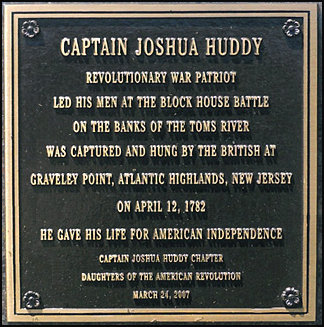On February 1, 1782, Joshua Huddy was given command of the blockhouse at Toms River that was built to protect the local salt works.
On March 24, 1782, Huddy finally faced a challenge he could not overcome. Commanding 25 men in the small fort at Toms River, built to defend a salt factory – salt was essential for food preservation and troop provisioning – Huddy learned that a large force of Loyalist raiders was sailing toward his post. He dispatched a scouting party to discover the enemy’s precise location, but before they could gather any intelligence it was too late: the Loyalists had reached the blockhouse. Outnumbering Huddy’s shorthanded company four-to-one, the Loyalists quickly overpowered their foes, killing eight and taking most of the rest prisoner. Huddy was one of the captives, not one of the casualties; nonetheless, the battle was to be his last.
Huddy may have been the most prominent victim of the Loyalist attack, but as documents suggest, the harm extended further. Sarah Farr, the wife of one of the blockhouse’s defenders, lost not only a husband but the father of her then-unborn child. Elizabeth Kinsley also lost her husband and, like Farr, became destitute enough to seek assistance from the government pension system. The militiaman Joseph Parker managed to elude capture in the battle, but he witnessed the unsettling sight of a fellow Patriot lying “dead, he being shot in the head,” and had to help bury him. Moreover, virtually all the residents of Toms River lost their homes and businesses to Loyalist torches.
Huddy was captured and taken to one of the British sugar house prisons in New York City, where the leader of the Board of Associated Loyalists, William Franklin (the last Royal Governor of New Jersey, and illegitimate son of Patriot icon Benjamin Franklin), approved Huddy’s execution.
Source:
Saretzky, Gary D. (2004). THE JOSHUA HUDDY ERA: Documents of the American Revolution. Catalog of the Exhibition at Monmouth County Library Headquarters, Manalapan, N.J. October, 2004; Revised November 2004. Produced by the Monmouth County Archives. Available: https://www.monmouthcountyclerk.com/archives/events-exhibits/2004-documents-of-the-american-revolution-joshua-huddy-era/


Leave a Reply